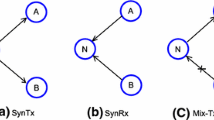Abstract
In Multi-hop Wireless Networks (MWNs), the end-to-end performance degrades exponentially with hop counts and the degree of traffic aggregation at each hop. Fair allocation of bandwidth among nodes is one of the challenging problems in MWNs. The IEEE 802.11 distributed coordination function standard stipulates long-term equalization of throughput among stations by giving the same number of transmission opportunities regardless of their individual bit rates. In this paper, we propose a bandwidth allocation scheme for MWNs that uses the underlying hop contention graph, along with hop counts and traffic aggregates in order to achieve a long-term equalization of the end-to-end throughput. The proposed scheme first determines direct and indirect (hidden) contentions among nodes, it then finds the end-to-end upstream and downstream access probabilities, and finally allocates access opportunities accordingly. The scheme significantly improves fairness among nodes. The performance, in terms of throughput, delay, and fairness, has been studied under various traffic sources, traffic loads, and different network topologies.











Similar content being viewed by others
References
Andrew LLH, Hanly SV, Mukhtar RG (2008) Active queue management for fair resource allocation in wireless networks. IEEE Transactions on Mobile Computing 7(2):231–246. doi:10.1109/TMC.2007.70724
Bianchi G (2000) Performance analysis of the IEEE 802.11 distributed coordinationfunction. Selected Areas in Communications, IEEE Journal on 18(3):535–547. doi:10.1109/49.840210
Dong Q, Banerjee S, Liu B (2006) Throughput optimization and fair bandwidth allocation in multi-hop wireless LANs. In: INFOCOM, IEEE
Ergen M, Varaiya P (2005) Throughput analysis and admission control for IEEE 802.11a. MONET 10(5):705–716
Felemban E, Ekici E (2011) Single hop IEEE 802.11 DCF analysis revisited: Accurate modeling of channel access delay and throughput for saturated and unsaturated traffic cases. IEEE Transactions on Wireless Communications 10(10):3256–3266
Friis HT (1946) A note on a simple transmission formula. Proceedings of the IEEE 34(5):254–256
Gao Y, Chiu DM, Lui JCS (2006) Determining the end-to-end throughput capacity in multi-hop networks: Methodology and applications. In: Proceedings of the Joint International Conference on Measurement and Modeling of Computer Systems, ACM Press, Saint-Malo, France, pp 39–50
Gerla M, Bagrodia R, Zhang L, Tang K, Wang L (1999) Tcp over wireless multihop protocols: Simulation and experiments. pp 1089–1094
Heusse M, Rousseau F, Berger-Sabbatel G, Duda A (2003) Performance anomaly of 802.11b. In: INFOCOM
Hira MM, Tobagi FA, Medepalli K (2007) Throughput analysis of a path in an IEEE 802.11 multihop wireless network. In: WCNC, IEEE
Jain R (1991) The Art of Computer System Performance Analysis. John Wiley, Inc.
Kolar V, Bharath K, Abu-Ghazaleh NB, Riihijarvi J (2009) Contention in multi-hop wireless networks: model and fairness analysis. In: Proceedings of the 12th ACM international conference on modeling, analysis and simulation of wireless and mobile systems, ACM, New York, NY, USA, MSWiM ’09, pp 21–29. doi:10.1145/1641804.1641812
Li Z, Nandi S, Gupta AK (2004) Achieving mac fairness in wireless ad-hoc networks using adaptive transmission control. In: Proceedings of the Ninth International Symposium on Computers and Communications 2004 Volume 2 (ISCC”04) - Volume 02, IEEE Computer Society, Washington, DC, USA, ISCC ’04, pp 176–181. http://dl.acm.org/citation.cfm?id=1126253.1129795
Lin L, Fu H, Jia W (2008) An efficient admission control for IEEE 802.11 networks based on throughput analyses of (un)saturated channel. Int J Communication Systems 21(7):755–771
Raniwala A, De P, Sharma S, Krishnan R, cker Chiueh T (2007) End-to-end flow fairness over IEEE 802.11-based wireless mesh networks. In: INFOCOM, IEEE, pp 2361–2365
Rao A, Stoica I (2008) Adaptive distributed time-slot based scheduling for fairness in multi-hop wireless networks. In: ICDCS ’08: Proceedings of the 2008 The 28th International Conference on Distributed Computing Systems, IEEE Computer Society, Washington, DC, USA, pp 874–882
Tan G, Guttag JV (2004) Time-based fairness improves performance in multi-rate WLANs. In: USENIX Annual Technical Conference, General Track, USENIX, pp 269–282
Xiao Y (2005) Performance analysis of priority schemes for IEEE 802.11 and IEEE 802.11e wireless LANs. IEEE Transactions on Wireless Communications 4(4):1506–1515.
Author information
Authors and Affiliations
Corresponding author
Rights and permissions
About this article
Cite this article
Hoblos, J., Peyravi, H. Access Disparity Mitigation in Multi-hop Wireless Networks. Int J Wireless Inf Networks 22, 85–96 (2015). https://doi.org/10.1007/s10776-015-0263-2
Received:
Accepted:
Published:
Issue Date:
DOI: https://doi.org/10.1007/s10776-015-0263-2




